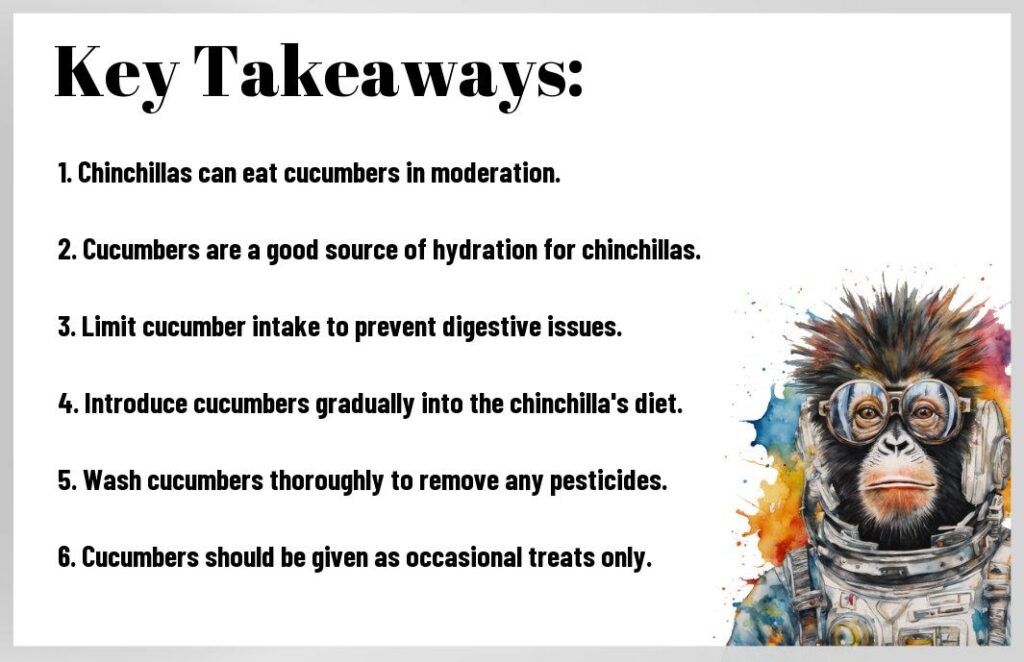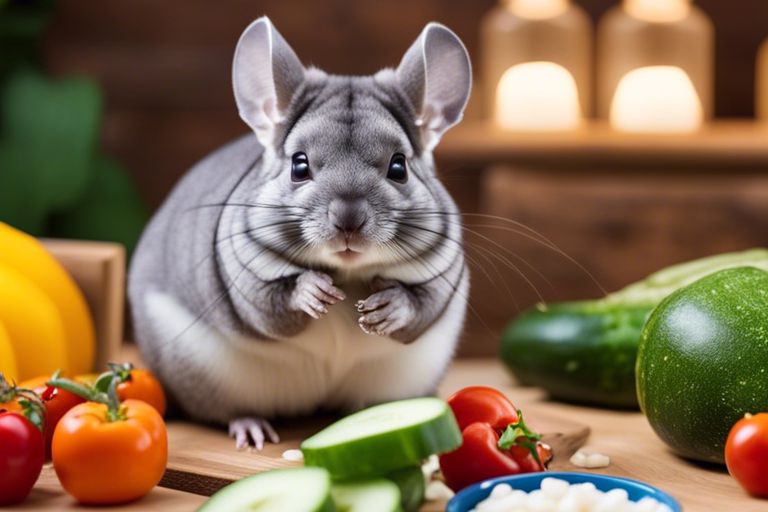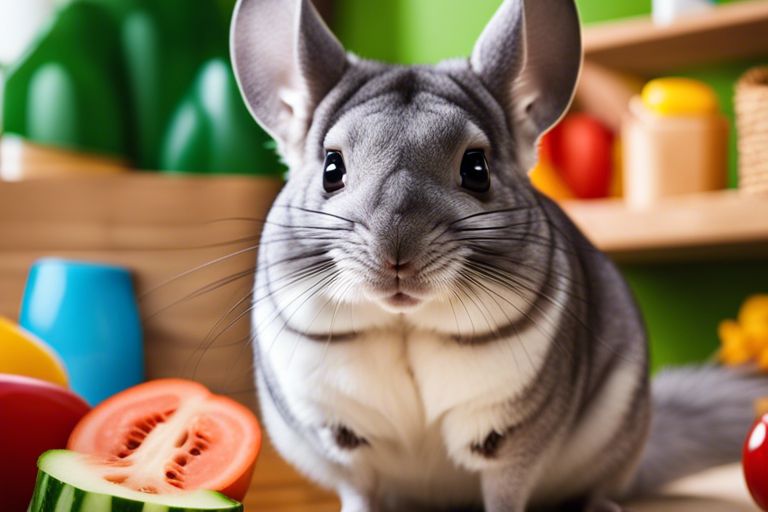Have you ever wondered whether you can safely feed your chinchilla cucumbers? Well, the answer is yes, chinchillas can eat cucumbers. However, there are some important things you need to consider before offering this refreshing treat to your furry friend. Cucumbers are a great source of hydration for chinchillas, especially during hot weather, and they are also packed with beneficial nutrients such as vitamins and minerals. However, it’s crucial to remember that cucumbers should only be given to chinchillas as an occasional treat due to their high water content, which can cause digestive issues if consumed in excess. Additionally, always make sure to thoroughly wash the cucumber and remove any seeds as they can pose a choking hazard. By following these guidelines, you can safely incorporate cucumbers into your chinchilla’s diet to provide variety and nutrition.

Nutritional Value of Cucumbers
Some of the key nutritional components of cucumbers include water, fiber, and vitamins K and C. These nutrients can offer health benefits to small animals like chinchillas, but it’s important to understand the full nutritional profile of cucumbers before introducing them into your pet’s diet.
Components of Cucumbers
Cucumbers are made up of about 95% water, making them an excellent low-calorie, hydrating snack for chinchillas. In addition to their high water content, cucumbers also contain a good amount of fiber, which can aid in digestion and promote gut health in your pet. They also provide small amounts of vitamins K and C, both of which are important for overall health and immune function.
Benefits and Downsides for Small Animals
While cucumbers offer hydration and some essential nutrients for your chinchilla, it’s important to be aware of the potential downsides as well. Although cucumbers are generally safe for chinchillas in moderation, it’s essential to remember that they should not make up the majority of your pet’s diet. Excessive consumption of cucumbers can lead to digestive upset and diarrhea in chinchillas. Additionally, the outer skin of cucumbers can be difficult for chinchillas to digest, so it’s essential to peel them before feeding them to your pet.
Chinchillas Digestive System
Obviously, it’s important to understand the digestive system of a chinchilla before determining whether or not they can eat cucumbers. Chinchillas are hindgut fermenters, which means they have a large cecum where cellulose and other plant materials are broken down with the help of bacteria. This process allows them to extract nutrients from their fibrous diet.
Unique Aspects of Chinchilla Digestion
Chinchillas have a highly specialized digestive system that is adapted to their natural diet of roughage and grasses. Their digestive system functions best when they consume a diet high in fiber and low in fat. The cecum in their digestive tract is particularly unique, as it plays a crucial role in breaking down fibrous materials and extracting nutrients. Additionally, chinchillas have a relatively slow digestion process, which means that their diet should consist of primarily hay and grasses to promote healthy digestion.
Risks of Feeding Chinchillas the Wrong Foods
Feeding your chinchilla the wrong foods can have serious consequences for their health. Foods that are high in fat or sugar can disrupt their delicate digestive balance, leading to gastrointestinal issues such as bloating, diarrhea, and even fatal digestive stasis. It’s crucial to provide your chinchilla with a diet that is high in fiber and low in sugar and fats to prevent these risks. Furthermore, certain foods, such as cucumbers and other watery vegetables, can cause digestive upset and should be fed sparingly if at all.
Feeding Cucumbers to Chinchillas
To answer the burning question – yes, chinchillas can indeed eat cucumbers. These small, crunchy vegetables are a great source of hydration and essential nutrients for your furry friend. However, there are a few things you need to consider before incorporating cucumbers into your chinchilla’s diet.
How to Properly Introduce Cucumbers to Chinchillas
When introducing cucumbers to your chinchilla’s diet, it’s important to do so gradually. Start by offering a small slice and monitor your chinchilla for any signs of digestive upset. If they tolerate it well, you can slowly increase the amount over time. You should always wash the cucumber thoroughly and remove any seeds before feeding it to your pet.
Portion Size and Frequency of Feeding
While cucumbers can be a healthy addition to your chinchilla’s diet, it’s essential to feed them in moderation. You should only offer cucumber as an occasional treat, alongside their regular diet of hay and pellets. Too much cucumber can lead to an upset stomach and diarrhea in chinchillas, so be sure to limit the portion size and frequency of feeding.

Alternatives to Cucumbers
Not all chinchillas enjoy cucumbers, and some may have digestive issues when they consume this vegetable. If you’re looking for alternatives to cucumbers to add some variety to your chinchilla’s diet, there are several options to consider. One alternative to cucumbers is celery, which is a safe and healthy option for chinchillas. You can also offer small pieces of bell peppers, carrots, or zucchini as occasional treats. These alternatives can provide your chinchilla with additional nutrients while adding variety to their diet.
Recommended Fruits and Vegetables for Chinchillas
When it comes to adding fruits and vegetables to your chinchilla’s diet, it’s important to choose options that are safe and healthy for them. Some recommended fruits include apples, bananas, and strawberries, while suitable vegetables include celery, bell peppers, and carrots. These treats can be given in small quantities to provide additional nutrients and variety to your chinchilla’s diet. Remember to introduce new foods gradually to avoid any digestive issues.
Foods to Avoid in a Chinchilla’s Diet
While there are many safe and healthy options for your chinchilla to enjoy, there are also certain foods you should avoid feeding them. Foods that are high in sugar or fat can lead to obesity and other health issues in chinchillas. Avoid feeding your chinchilla foods like chocolate, avocado, and any human snacks that are high in sugar or salt. Additionally, it’s important to avoid giving them foods that are toxic to chinchillas, such as onions, garlic, and rhubarb. Always research and double-check before introducing new foods into your chinchilla’s diet to ensure their safety.
Can Chinchillas Eat Cucumbers?
With this in mind, it is important to remember that chinchillas should not be fed cucumbers. While they may enjoy the taste, cucumbers are not suitable for chinchillas and can cause digestive issues. It is important to prioritize your chinchilla’s health and well-being by offering them a balanced diet of hay, pellets, and limited fresh vegetables. By being mindful of what you feed your chinchilla, you can ensure they remain healthy and happy.
